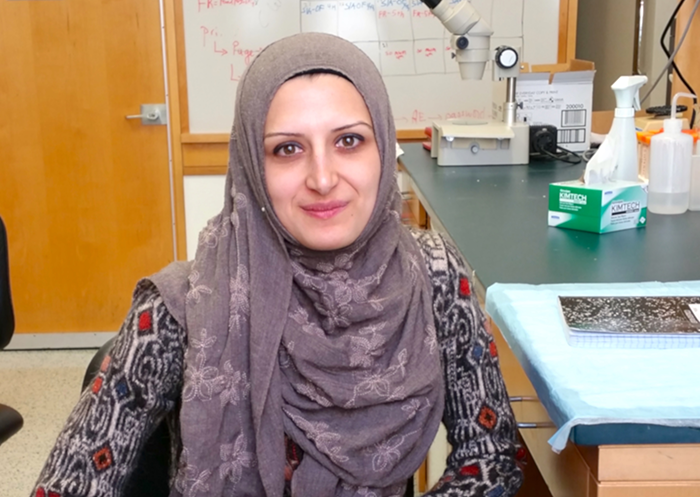We’re taking time over the following weeks to get to know the members of the GSA’s Early Career Scientist Committees. Join us every week to learn more about our early career scientist advocates.
![]()
Faten Taki
Liaison, Career Development Subcommittee
Weill Cornell Medicine
Research Interest:
Currently, more than 43 million adults in the U.S. suffer from mental illness. The costs of mental illness are about $193 billion in the U.S. and are expected to reach $6 trillion worldwide by 2030. Due to this high health burden, a better understanding of the mechanisms behind adult psychiatric disorders induced by early life conditions is crucial to ameliorate or even prevent the progression of such conditions.
The postnatal period is highly sensitive to stress in the maternal environment. Conditions such as economic strife, health problems, drug abuse, pollution, and lack of parental care experienced during early life can have a permanent effect on an individual’s fitness, increasing the risk for and rate of neuropsychiatric disorders in these individuals when they become adults. Infants acquire immune factors, microbiota, and other important molecules through the mother’s milk, and disruptions to these factors can have an enduring effect.
My work focuses on the impact of conditions experienced by the mother (e.g. infection, inflammation, postpartum depression) during the lactation period on their offspring’s neuropsychiatric wellbeing. We call this phenomenon—wherein the mother can influence the developmental trajectories of the offspring through milk factors—lacto-programming. I follow a holistic approach where I check changes that may occur 1) in the mother’s milk and subsequently 2) in the offspring by looking at an array of endpoints (e.g. behavior, transcriptome, microbiome, metabolome, methylome, immunome). I try to link changes in maternal milk to changes in offspring behavior by doing a series of reversal experiments that may or may not rescue the offspring’s phenotype, thereby identifying potential causative factors that influence the offspring’s life trajectory. By understanding the mechanisms behind maternal induced lacto-programming, we can neutralize maternal milk or supplement infants with milk formula to consequently prevent the progression of disease trajectories in the offspring that are related to early life adversities.
As a PhD-trained scientist, you have many career options. What career paths interest you the most?
During my career, I want to continue to learn new things while also trying to positively contribute to the lives of those around me. Working in a capacity that allows me to interact with diverse communities to collect data and scientific knowledge would be very rewarding. I envision this involving communities across the world where living conditions are in dramatic contrast to each other; these environment differences present many different research questions. I am very interested in studying the composition and nutritional quality of breast milk as a means of non-genetic inheritance, and I would love to be able to communicate these types of findings with people of these diverse populations to affect policy.
In addition to your research, how else do you want to advance the scientific enterprise?
Being a member of the GSA committees affords me the opportunity to engage in a variety of activities that let me contribute to science as a whole. I am able to network with professionals from diverse disciplines, to interact with colleagues in other institutions across the nation, to match my interests and work skills to a good career, to be a peer-reviewer (and to be peer-reviewed), to learn about career and grant opportunities, to work in a team setting, to familiarize myself with the variety of available careers, and to have a very well-rounded experience outside of the lab.
As a leader within the Genetics Society of America, what do you hope to accomplish?
I am excited to share my background and previous experiences as a young lady from Lebanon seeking a career in biological research. I moved out of my home for the first time to a new continent to do research—never having held a pipet in my life! Though there have been many challenges and obstacles along the way, I am now doing a postdoc in a mouse lab using a combination of wet lab and computational methods to study neuroscience. I want to use the things I have learned from jumping out of my comfort zone in my personal life and in science to mentor other early career scientists. This idea of mentoring is non-existent back home, but I have quickly realized its significance during my training experiences in the United States.
More broadly, my goal is to be able to give back to the scientific community while I am still growing as an early career scientist. Being a part of the Early Career Scientist Leadership Program provides me with opportunities to make important contributions to the community while expanding my professional skills. Taken together, this leadership experience has made me a better scientist and mentor, allowing me to make more significant contributions throughout my career.
Previous Leadership Experience:
- Trainee Advisory Representative – Genetics Society of America Mentoring and Professional Development Committee













